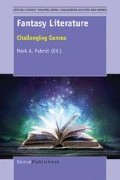Abstract
Due to its incredible popularity, particularly among young people, the Harry Potter series can be an excellent teaching tool for secondary teachers: The novels provide academic motivation for many students who enjoyed the book as children, they help enrich the imaginations of readers by immersing them in what J.R.R. Tolkien (1939/1983) calls a “Secondary World,” and they open up new avenues of analysis and literary discussion.
Access this chapter
Tax calculation will be finalised at checkout
Purchases are for personal use only
Preview
Unable to display preview. Download preview PDF.
References
Baggett, D., & Klein, S. E. (Eds.). (2004). Harry Potter and philosophy: If Aristotle ran Hogwarts. Chicago, IL: Open Court Pub.
Beach, R., Thein, A. H., & Webb, A. (2016). Teaching to exceed the English Language Arts Common Core State Standards: A critical inquiry approach for 6-12 classrooms (2nd ed.). New York, NY: Routledge.
Beaton, T. (2006). Harry Potter as a context for interdisciplinary studies. English Journal, 95(3), 100-103.
Bright, A. (2011). Writing Homer, reading Riordan: Intertextual study in contemporary adolescent literature. The Journal of Children’s Literature, 37(1), 38-47.
Carmeli, R. (2009). Four models of fatherhood: Paternal contributors to Harry Potter’s psychological development. In D. Patterson (Ed.), Harry Potter's world wide influence (pp. 11-34). Newcastleupon-Tyne, UK: Cambridge Scholars Publishing.
Cherland, M. (December 2008/January 2009). Harry’s girls: Harry Potter and the discourse of gender. Journal of Adolescent & Adult literacy, 52(4), 273-282. doi: 10.1598/JAAL.52.4.1
Collaborative for Academic, Social, and Emotional Learning (CASEL). (2009). Social and emotional learning and bullying prevention. Chicago, IL: American Institute for Research.
de Beauvoir, S. (2004). An eye for an eye. In S. de Beauvoir & M. A. Simons (Eds.). Simone de Beauvoir: Philosophical writings (pp. 237-260). Urbana: University of Illinois.
Ford, J. (2012). Fantasy classics: Hobbits and Harry in interdisciplinary courses. In E. Dial-Driver, S. Emmons, & J. Ford (Eds.), Fantasy media in the classroom: Essays on teaching with film, television, literature, graphic novels, and video games (pp. 138-147). Jefferson, NC: McFarland & Co., Inc.
Frankel, V. E. (Ed.) (2013). Teaching with Harry Potter: Essays on classroom wizardry from elementary school to college. Jefferson, NC: McFarland & Co., Inc.
Freire, P. (2000). Pedagogy of the oppressed (M. B. Ramos, Trans.). New York, NY: Continuum. (Original work published 1970)
Friedman, A. A. (2000). Nurturing reflective judgment through literature-based inquiry. English Journal, 89(6), 96-104.
Hallett, C. J., & Huey, P. J. (Eds.). (2012). J.K. Rowling: Harry Potter. New York, NY: Palgrave Macmillan.
Hallett, C. W. (Ed.) (2005). Scholarly studies in Harry Potter. Lewiston, NY: The Edwin Mellen Press.
Ionoaia, E. (2009). Moral fibre and outstanding courage: Harry Potter’s ethic of courage as a paradigm for the muggle world. In D. Patterson (Ed.), Harry Potter’s world wide influence (pp. 49-76). Newcastle-upon-Tyne, UK: Cambridge Scholars Publishing.
Lankshear, C. & McLaren, P. L. (Eds.). (1993). Critical literacy: Politics, praxis, and the postmodern. Albany: SUNY Press.
Lewison, M., Flint, A. S., Van Sluys, K., & Henkin, R. (2002). Taking on critical literacy: The journey of newcomers and novices. Language Arts, 79(5), 382-392.
Machiavelli, N. (1977). The prince (2nd ed.) (R. M. Adams, Ed., & R. M. Adams, Trans.). New York, NY: W. W. Norton. (Original work published in 1532)
McLaughlin, M., & DeVoogd, G. L. (2004). Critical literacy: Enhancing students’ comprehension of text. New York, NY: Scholastic Press.
Niemöller, M. (1946). First they came for the Socialists. Retrieved February 5, 2016, from http://www.ushmm.org/wlc/en/article.php?ModuleId=10007392
Patterson, D. (Ed.) (2009). Harry Potter’s world wide influence. Newcastle-upon-Tyne, UK: Cambridge Scholars Publishing.
Prinzi, T. (2009). Harry Potter & imagination: The way between two worlds. Allentown, PA: Zossima Press.
Rowling, J. K. (1997). Harry Potter and the sorcerer’s stone. New York, NY: Arthur A. Levine Books.
Rowling, J. K. (1998). Harry Potter and the chamber of secrets. New York, NY: Arthur A. Levine Books.
Rowling, J. K. (1999). Harry Potter and the prisoner of Azkaban. New York, NY: Arthur A. Levine Books.
Rowling, J. K. (2000). Harry Potter and the goblet of fire. New York, NY: Arthur A. Levine Books.
Rowling, J. K. (2003). Harry Potter and the order of the phoenix. New York, NY: Arthur A. Levine Books.
Rowling, J. K. (2007). Harry Potter and the deathly hallows. New York, NY: Arthur A. Levine Books.
Ruwe, D. (2013). International quidditch: Using cultural translation exercises to teach word choice and audience. English Journal, 102(4), 82-88.
Smagorinsky, P. (2008). Teaching English by design: How to create and carry out instructional units. Portsmouth, NH: Heinemann.
Stover, L. T. (2003). “Mind the gap”: Building bridges between adolescent readers and texts. English Journal, 92(4), 77-83.
Thomas, J. E., & Snyder, F. G. (Eds.). (2010). The law and Harry Potter. Durham, NC: Carolina Academic Press.
Tolkien, J. R. R. (1983). On fairy-stories. In C. Tolkien (Ed.), The monsters and the critics and other essays (pp. 5-48). London, UK: HarperCollins. (Original work published in 1939)
Whited, L. A., & Grimes, M. K. (2002). What would Harry do? J. K. Rowling and Lawrence
Kohlberg’s theories of moral development. In L. A. Whited (Ed.), The ivory tower and Harry Potter: Perspectives on a literary phenomenon (pp. 182-208). Columbia: University of Missouri Press.
Willson-Metzger, A. (2009). The life and lies of Albus Dumbledore: The ethics of information sharing and concealment in the Harry Potter novels. In D. Patterson (Ed.), Harry Potter’s world wide influence (pp. 293-304). Newcastle-upon-Tyne, UK: Cambridge Scholars Publishing.
Author information
Authors and Affiliations
Editor information
Editors and Affiliations
Rights and permissions
Copyright information
© 2016 Sense Publishers
About this chapter
Cite this chapter
Fabrizi, M.A. (2016). You’re a Prince, Harry. In: Fabrizi, M.A. (eds) Fantasy Literature. Critical Literacy Teaching Series: Challenging Authors And Genres. SensePublishers, Rotterdam. https://doi.org/10.1007/978-94-6300-758-0_4
Download citation
DOI: https://doi.org/10.1007/978-94-6300-758-0_4
Publisher Name: SensePublishers, Rotterdam
Online ISBN: 978-94-6300-758-0
eBook Packages: EducationEducation (R0)

